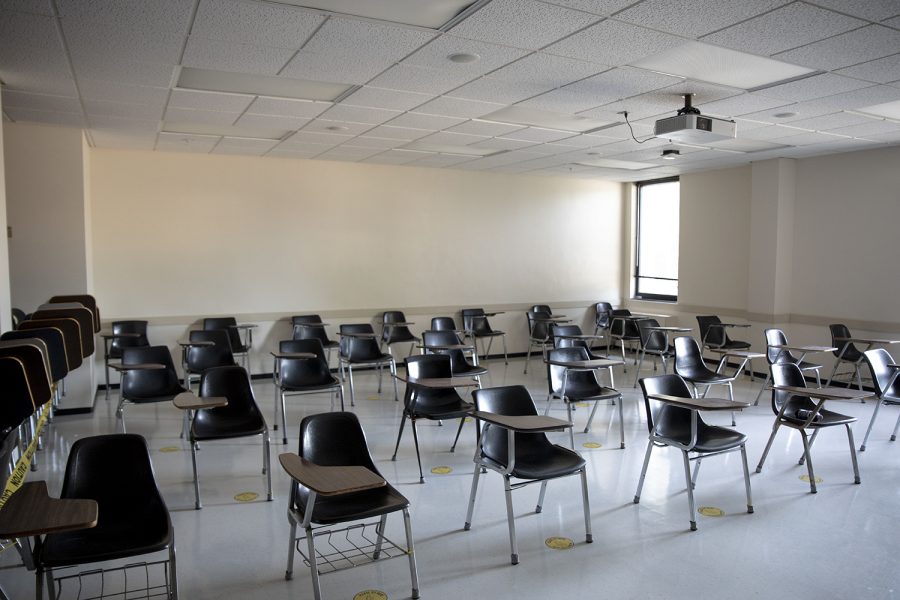Opinion | There needs to be a way to evaluate teaching assistants earlier in the semester
Currently, there is not really any way for students to give any form of feedback to teaching assistants until the end of the semester, and that needs to change.
Classroom 105 at the EPB- English-Philosophy Building 251 W Iowa Ave. Sits empty As seen on Friday Aug 28,2020 (Jeff Sigmund/Daily Iowan))
October 7, 2021
There are very few things that can ruin a student’s learning experience quite like a bad learning environment. The University of Iowa, like most public universities, has a way for students to give feedback to professors and teaching assistants at the end of each semester.
The course evaluation at the end of the semester allows students to voice their frustration in these situations. What does not get talked about quite as much is how a bad teaching assistant can affect the student’s ability to learn in class.
It is understandable that teaching assistants are not going to be quite as refined as the main instructor of a course. But there is not currently a method for students to voice their concerns when the teaching assistant is the teacher.
When this happens, there is not really anyone for students to voice their complaints to other than the department head. It took until a summer course I personally took to realize how little students were able to really do anything about this.
As an article in the Guardian points out, teaching assistants are often only given the bare minimum information to teach with. If a student wants to know something somewhat more advanced there is a high probability they will not be able to get the information from the teaching assistants.
This is undoubtedly frustrating for both students and teaching assistants. But the teaching assistants are students themselves, there are no real ways for students to give those teaching assistants feedback before the end of the semester. Some teaching assistants, like Media Studies teaching assistant Courtney Klein, said they are given enough of the necessary tools and their professors are so helpful that it doesn’t become an issue, but that may not always be the case.
“However, I also like the idea of ongoing formative feedback so I can make sure that I am best serving the needs of my students,” Klein said. “During the first discussion held at the beginning of the semester, I try to make it a point that students can call me out if they think I could be doing a better job in some or all aspects of how I conduct discussion.”
Guy Meyer, a teaching assistant in the Spanish department, makes an effort to obtain feedback throughout the semester.
“The first year you are a TA, they give you an introduction to the textbook and how to use it as a planning resource. You take a first-semester class on foreign language and teaching foreign language in general,” Meyer said. “We are allowed to make our own exercises. There is a method of teaching called communicative training which has students making the conversation to learn about the language.”
In terms of feedback, the supervising professor watches the teaching assistants give the lectures and provides them feedback on how they teach. Around the third week of classes, Meyer likes to ask students for feedback over email, and he often gets responses.
“Last year I got responses on things that were distracting in the class and wanted me to stop and they wanted me to write things down more,” Meyer said.
This would be the ideal way for teaching assistants to approach their class, but it is not universal. At the moment, not all students in these classes have a way of providing feedback to these teaching assistants. Teaching assistants should be able to improve their methods throughout the semester, which doesn’t help if they don’t receive feedback until the very end.
Columns reflect the opinions of the authors and are not necessarily those of the Editorial Board, The Daily Iowan, or other organizations in which the author may be involved.



